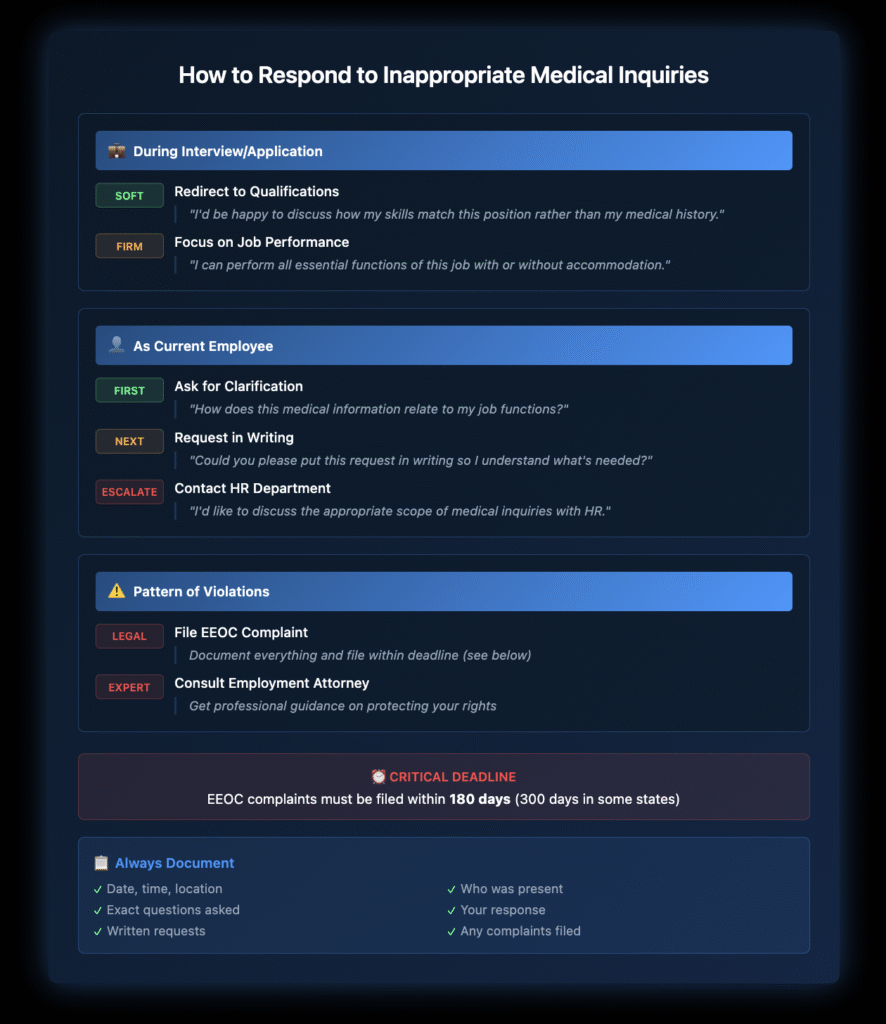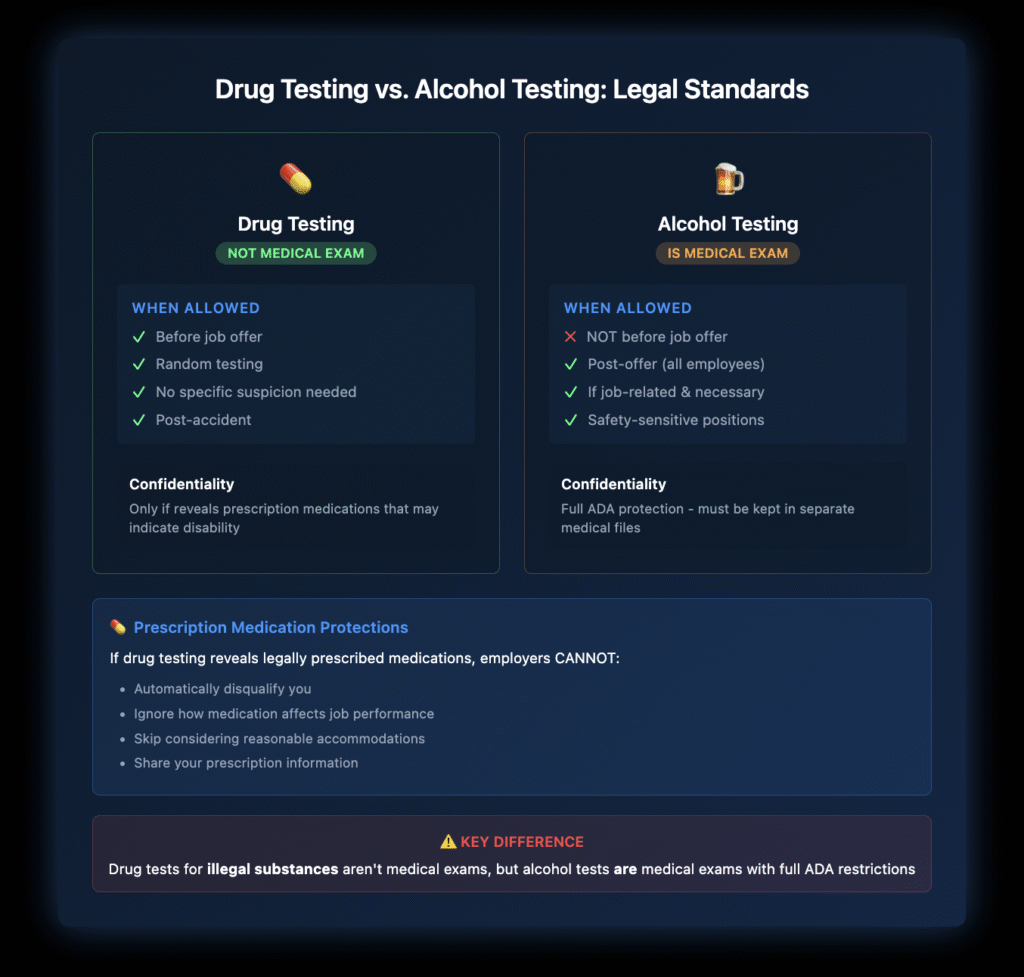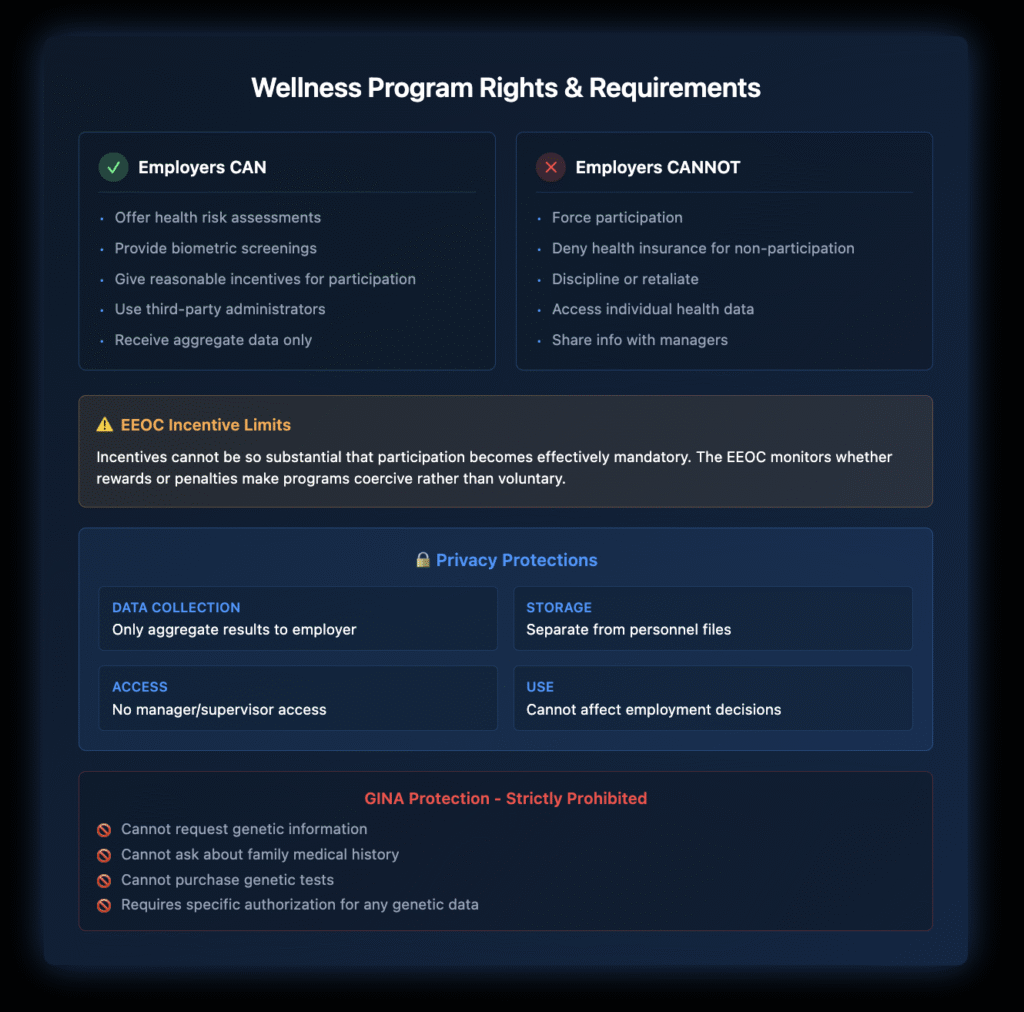Your employer can’t ask about your medical conditions during a job interview, but they can require a full medical exam after making you a job offer – and the rules change again once you’re actually employed. The Americans with Disabilities Act (ADA) creates three distinct stages of employment with different medical privacy protections at each stage, preventing discrimination while allowing employers to verify genuine job qualifications and safety requirements.
Before a job offer, employers face strict limits on medical questions and can’t even ask if you have a disability. After extending a conditional offer, they gain significant freedom to examine and inquire about your health, as long as they treat all new hires in that position the same way. Once you’re working, medical inquiries must relate directly to your job and serve a legitimate business purpose – your employer can’t just satisfy their curiosity about your health status.
Key Takeaways
- Pre-employment protection is absolute: Employers cannot ask any medical questions or require examinations before making a job offer.
- Post-offer examinations must be universal: Any medical screening after a job offer must apply to all new hires in that job category.
- Current employees have balanced protections: Medical inquiries during employment must be job-related and serve a necessary business purpose.
- Confidentiality is mandatory: All medical information must stay in separate files with restricted access.
- Wellness programs must be voluntary: Employers can’t force participation or heavily penalize non-participation in health programs.
- Documentation matters: Keep records of all medical inquiries and your responses to protect your rights.
Disclaimer: This article provides general information for informational purposes only and should not be considered a substitute for legal advice. It is essential to consult with an experienced employment lawyer at our law firm to discuss the specific facts of your case and understand your legal rights and options. This information does not create an attorney-client relationship.
What Legal Framework Protects Your Medical Privacy at Work?
The Americans with Disabilities Act provides your primary shield against inappropriate medical examinations and inquiries, protecting all employees and applicants regardless of whether they have disabilities. This comprehensive law works alongside the Genetic Information Nondiscrimination Act (GINA), which specifically prohibits questions about family medical history and genetic information, plus state laws that often provide additional protections beyond federal requirements.
The ADA divides employment into three stages with different rules for each. During the pre-offer application stage, employers face the strictest limits and can’t ask about medical conditions at all. After making a conditional job offer, they can conduct medical examinations and ask detailed health questions, but only if they apply the same requirements to everyone in that job category. Once you’re employed, the law strikes a balance – allowing medical inquiries only when they directly relate to your ability to perform essential job functions safely.
This staged approach recognizes that early-stage medical questions often lead to discrimination based on assumptions rather than actual job capabilities. The law prevents employers from screening out qualified candidates with disabilities while still allowing them to ensure employees can perform essential functions and maintain workplace safety.
What Medical Questions Can Employers Ask Before Making a Job Offer?
Before extending a job offer, employers cannot ask about disabilities, medical conditions, prescription medications, workers’ compensation history, or sick leave usage at previous jobs – period. They can’t require medical examinations, physical fitness tests that might reveal disabilities, or access to your medical records. These restrictions apply even if a disability seems obvious or if you’ve already mentioned a health condition during the interview.
Employers can, however, ask if you’re able to perform essential job functions with or without reasonable accommodation. They may request that you demonstrate how you’d perform specific tasks or take non-medical skills tests that all applicants must complete. The distinction focuses on your ability to do the job, not your medical status.
If an interviewer asks inappropriate medical questions, you can redirect the conversation to your qualifications or answer in terms of job performance rather than health status. While it’s challenging to confront potential employers during a job search, documenting inappropriate questions helps if you later need to prove discrimination occurred.
How Do Medical Examination Rules Change After a Job Offer?
After making a conditional offer, employers gain significant latitude to require comprehensive medical examinations, ask unlimited questions about current and past conditions, request medical records, and conduct drug tests. They can even withdraw the job offer based on examination results – but only if you can’t perform essential job functions even with accommodations, or if you’d pose a direct threat that accommodations couldn’t reduce.
The key protection at this stage requires consistency. All entering employees in the same job category must face the same medical requirements. An employer can’t single out individuals for extra screening based on appearance, suspected conditions, or other discriminatory reasons.
You maintain important rights during post-offer examinations, including the right to request reasonable accommodations for any disabilities revealed, receive an individualized assessment rather than automatic disqualification based on a diagnosis, and know specifically why an offer was withdrawn if medical information disqualifies you.
When Can Your Current Employer Require Medical Information?
During employment, your employer can only request medical examinations or information when they have objective evidence that a medical condition affects your job performance or poses a safety risk. This “job-related and consistent with business necessity” standard prevents fishing expeditions into your health status based on stereotypes or curiosity.
Legitimate reasons for medical inquiries during employment include when you request reasonable accommodations, take FMLA leave, file a workers’ compensation claim, or when specific safety concerns arise about your ability to perform essential functions. Federal requirements for certain positions, like DOT medical certifications for commercial drivers, also justify ongoing medical monitoring.
Even when inquiries are justified, they must stay focused on the specific issue at hand. If you request accommodations for back pain, your employer can ask about limitations related to your back, but not unrelated conditions. This targeted approach protects your broader medical privacy while addressing legitimate workplace needs.
What Confidentiality Requirements Protect Your Medical Information?
All medical information your employer obtains must stay in separate, confidential files – never in your regular personnel file. This includes examination results, medical histories, disability documentation, accommodation requests, doctor’s notes, and workers’ compensation records. Only authorized personnel should have access, with physical and electronic records requiring appropriate security measures.
Limited disclosure is permitted only to supervisors who need to know about work restrictions or accommodations, first aid personnel if a disability might require emergency treatment, government officials investigating ADA compliance, and workers’ compensation or insurance offices, as state law requires. Even then, employers should share only the minimum necessary information – a supervisor might learn about work restrictions but not the underlying diagnosis.
You generally have the right to review medical information your employer maintains about you, request copies, seek corrections to inaccurate information, and know who has accessed your records. Reviewing your file periodically ensures accuracy and helps identify any inappropriate disclosures.
How Do Wellness Programs Affect Your Medical Privacy?
Workplace wellness programs that involve health assessments or biometric screenings must remain truly voluntary – employers can’t force participation, deny health insurance for non-participation, discipline you for opting out, or offer incentives so substantial that participation becomes effectively mandatory. The EEOC has established specific limits on permissible incentives to maintain this voluntary standard.
Medical information from wellness programs requires the same confidentiality protections as other medical records. Employers should only receive aggregate data that doesn’t identify individuals, and third-party administrators often manage programs specifically to maintain this firewall between health information and employment decisions.
Genetic information receives special protection under GINA. Employers cannot request genetic information or family medical history through wellness programs, and any genetic testing requires specific authorization with clear notice about how the information will be used and protected.

What Should You Know About Fitness for Duty Examinations?
Fitness for duty examinations are permitted when you return from medical leave with questions about your ability to safely perform essential functions, when objective evidence suggests a medical condition affects your job performance, or when concerning behavior indicates you might pose a safety risk. Law may also require examinations for certain safety-sensitive positions.
These examinations must focus only on the specific concern prompting them and address essential job functions. If you’re returning from knee surgery, the examination should evaluate physical abilities related to your knee, not explore unrelated health matters. Examinations extending beyond relevant job functions may violate the ADA.
For independent medical examinations where the employer chooses the doctor, they typically pay all costs. You may need to provide specific medical record releases; you should know the examination scope beforehand, and you’re entitled to receive a copy of the report. Consider consulting an employment attorney before any examination that seems inappropriately broad.
How Does Drug and Alcohol Testing Intersect with Medical Privacy?
Tests for illegal drugs don’t count as medical examinations under the ADA, allowing employers to conduct them before job offers, randomly, or without specific suspicion. However, if testing reveals legally prescribed medications that might indicate a disability, that information receives full ADA confidentiality protection.
Employers cannot automatically disqualify you for prescription medication use without considering whether it affects your ability to safely perform essential functions and whether reasonable accommodations might address any concerns. Some states provide additional protections for prescription medications, including medical marijuana in certain jurisdictions.
Alcohol testing differs from drug testing – it counts as a medical examination requiring job-relatedness during employment and full confidentiality for results. While alcoholism may qualify as a protected disability, employers can still prohibit alcohol use at work and require sobriety during work hours.

What Medical Documentation Can Employers Request for Leave?
Under the FMLA, employers may require certification, including the condition’s start date and probable duration, relevant medical facts, statements about your inability to perform job functions, and information about intermittent leave needs if applicable. You typically have 15 days to return certification, though circumstances may justify extensions.
For ADA accommodation leave, documentation should confirm a disability exists, explain how leave will help you perform essential functions upon return, and specify expected duration and return date. Documentation should establish the disability and leave need without including unrelated medical information.
If certification forms request excessive information, ask which sections are necessary, have your provider complete only relevant portions, provide alternative documentation addressing legitimate needs, or consult an attorney if the employer insists on unrelated information. Many standardized forms request more than necessary, and employers should accept appropriate documentation flexibly.
How Should You Respond to Inappropriate Medical Inquiries?
Potentially illegal medical inquiries often occur during the application process before offers, exceed the scope needed for job qualification verification, target only certain employees, lack objective evidence prompting them, request genetic or family history information, or stem from apparent stereotypes about conditions. Recognizing these red flags helps determine when to assert your rights.
When facing questionable inquiries, ask why the information is needed and how it relates to your job, provide limited information addressing only legitimate concerns, request inquiries in writing, or suggest alternatives that address concerns without revealing sensitive information. These approaches protect privacy while maintaining professional relationships.
If problematic inquiries persist, file internal HR complaints, submit EEOC charges within 180 days (300 days in some states), explore state agency complaints for additional protections, or consider private lawsuits after exhausting administrative remedies. Document everything – keep copies of written requests, note details of verbal inquiries, save documentation you provided, and maintain records of any complaints you raised.

Taking Action to Protect Your Medical Privacy Rights
Your medical information deserves protection throughout your employment relationship, from application through your entire tenure with an employer. The ADA and related laws create clear boundaries around when employers can inquire about your health, what they can ask, and how they must protect any information they obtain. Understanding these boundaries empowers you to maintain your privacy while fulfilling legitimate workplace requirements.
At Nisar Law Group, our employment attorneys help clients navigate complex medical privacy issues, whether facing intrusive inquiries, dealing with confidentiality breaches, or needing accommodations following medical disclosures. Your medical information is personal, and your employer’s need to know has legal limits.
If you’re concerned about workplace medical privacy violations or need guidance on responding to medical inquiries, contact us for a consultation tailored to your specific situation. Don’t let inappropriate medical questions or examination requirements go unchallenged – protect your rights and your privacy with experienced legal counsel on your side.
Frequently Asked Questions About Medical Examinations
No, they absolutely cannot. During interviews and the application process, employers are legally prohibited from asking about any medical conditions, disabilities, prescription medications, or your medical history. They can’t even ask if you have a disability or how many sick days you took at your last job. If an interviewer asks these questions, you can politely redirect to your qualifications or simply state you can perform all essential job functions.
You have no legal obligation to disclose medical conditions during the hiring process, and an employer cannot fire you for not volunteering this information. The ADA protects your right to medical privacy. You only need to disclose a condition if you’re requesting reasonable accommodations or if the employer makes a lawful medical inquiry after you’re hired (which must be job-related and necessary for business).
Your employer can request a doctor’s note confirming you were unable to work, but they cannot demand specific diagnosis details. For FMLA leave, they can require medical certification that includes general information about your condition’s impact on work, but not your specific diagnosis. For regular sick leave, a simple note stating you were under medical care and unable to work is typically sufficient.
Absolutely not. All medical information must be kept confidential in separate files with restricted access. Your employer can only share medical information with supervisors who need to know about work restrictions (not diagnoses), first aid personnel for emergency situations, and government officials investigating ADA compliance. Sharing your medical information with coworkers or unauthorized personnel violates the ADA.
An employer cannot fire you simply for having a medical condition – that’s illegal discrimination under the ADA. However, they can terminate employment if you cannot perform essential job functions even with reasonable accommodations, or if you pose a direct threat to safety that accommodations cannot eliminate. The key is they must engage in the interactive process and consider all possible accommodations first.
After extending a conditional job offer but before you start work, employers can require comprehensive medical examinations and ask unlimited health questions – but only if they require the same from all new hires in that job category. They can ask about current and past conditions, require drug tests, and request medical records. However, they can only withdraw the offer if you can’t perform essential functions even with accommodations.
No, participation in wellness programs must be truly voluntary. Your employer cannot force you to participate, deny health insurance for opting out, discipline you, or offer incentives so large that participation becomes practically mandatory. If the program includes health screenings or medical questions, your individual results must stay confidential and cannot be shared with managers making employment decisions.
You must file an EEOC complaint within 180 days of the violation (300 days in New York and certain other states). Don’t wait to document everything – keep records of inappropriate questions, who asked them, when they occurred, and any witnesses present. Missing this deadline could mean losing your right to pursue a claim, so consult with an employment attorney promptly if you believe your rights have been violated.
Related Resources
- What Qualifies as a Disability Under the ADA
- Reasonable Accommodations: What to Request and How
- Mental Health Disabilities: Special Considerations
- Invisible Disabilities in the Workplace
- Proving Disability Discrimination: Building Your Case
- Workplace Disability Discrimination: Your Complete Legal Guide
- When Employers Can Claim “Undue Hardship”
- Disability Discrimination in Remote Work Environments
- Long COVID as a Disability: Emerging Legal Considerations


